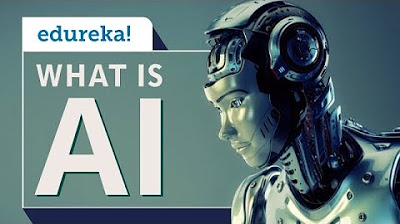How Powerful Will AI Be In 10 Years?
Summary
TLDRThe video script outlines the transformative impact of artificial intelligence (AI) on various aspects of our lives in the next decade. It highlights AI's potential in revolutionizing healthcare through early disease detection and personalized treatment, fostering economic growth and job creation, advancing space exploration, enhancing security and safety, and promoting sustainable energy and food production. The script also addresses AI's role in personalized education, social welfare, ethical considerations, and personal assistance, culminating in the pursuit of artificial general intelligence (AGI) that could fundamentally change our interaction with technology.
Takeaways
- 🏥 AI will transform healthcare by enabling early disease detection and personalized treatment plans.
- 💼 Economic growth and job creation will be boosted by AI, with remote work and automation becoming more prevalent.
- 🚀 Space exploration will benefit from AI integration, with robots playing a key role in scientific missions.
- 🔒 AI will enhance security and safety measures, improving surveillance and cybersecurity through real-time data analysis.
- 🌿 Sustainable energy and food production will be advanced by AI, optimizing farming practices and resource use.
- 🎓 Personalized education experiences will be made possible by AI, adapting to individual student needs and preferences.
- 🤖 Social welfare and ethical considerations will be positively impacted by AI, promoting fair access to essential services.
- 🗣️ Advanced personal assistance will become integral to daily life, with AI anticipating and managing tasks efficiently.
- 🏠 AI integration into daily routines will streamline household chores and improve quality of life.
- 🌟 The development of Artificial General Intelligence (AGI) aims to create machines with human-like cognitive abilities, opening up vast possibilities.
Q & A
How will AI impact healthcare in the next decade?
-AI will revolutionize healthcare by offering advanced solutions such as early disease detection through analyzing large patient data sets, personalized treatment plans based on individual genetic information and lifestyle factors, and integration into surgical assistance to redefine procedures and standards.
What role does AI play in economic growth and job creation?
-AI is expected to drive economic growth and create jobs by enabling remote work through AI-powered communication tools, automating repetitive tasks to increase productivity and innovation, and creating demand for skilled professionals in AI-related fields.
How can AI contribute to advancements in space exploration?
-AI, when integrated with space exploration, can enhance our scientific capabilities by allowing robots to undertake dangerous tasks in space. These AI-enabled robots can navigate difficult terrains, collect samples, and conduct experiments with high precision and efficiency, analyzing vast amounts of data in real-time.
What are the implications of AI for security and safety measures?
-AI-powered surveillance systems can monitor and safeguard communities and digital assets by detecting suspicious behavior or potential threats in real-time. AI-driven cybersecurity solutions can fortify digital infrastructures against cyber threats and predict potential risks, providing proactive defense mechanisms.
How can AI address challenges in sustainable energy and food production?
-AI can optimize sustainable energy and food production through precision agriculture and smart farming techniques. By using data analytics, IoT sensors, and machine learning algorithms, AI can make data-driven decisions on irrigation, fertilization, pest control, and harvesting, leading to higher yields and minimized environmental impact.
What is the potential of AI in revolutionizing education?
-AI integration into education can lead to personalized education experiences. Adaptive learning systems, powered by AI algorithms, can analyze student data to understand their strengths, weaknesses, and preferences, delivering customized learning pathways and content to suit individual needs effectively.
What are some social welfare and ethical considerations of AI integration into society?
-AI systems can prioritize social welfare by promoting fair access to resources and addressing societal challenges like poverty and healthcare disparities. AI can enhance access to essential services, bridging gaps in access for underserved populations and ensuring everyone has the resources they need to thrive.
How will AI change the way we approach personal assistance?
-AI-powered personal assistance will become indispensable, integrating with smart devices to streamline tasks and enhance productivity. These systems can anticipate user needs and preferences, offering proactive assistance tailored to individual preferences, managing schedules, and handling routine tasks efficiently.
In what ways is AI integrating into our daily lives?
-AI is becoming ubiquitous in our daily lives, assisting with tasks from household chores to meal preparation. Smart home devices and systems can automate mundane tasks, reducing stress and enhancing the quality of life by providing more time for relaxation and leisure activities.
What is artificial general intelligence (AGI) and its significance?
-AGI represents a major milestone in AI, aiming to create machines with cognitive abilities comparable to humans. It seeks to enable machines to understand, learn, and apply knowledge across a wide range of tasks and domains, going beyond current narrow AI systems, and enabling them to adapt to new situations, solve complex problems, and exhibit creativity and intuition.
Outlines

This section is available to paid users only. Please upgrade to access this part.
Upgrade NowMindmap

This section is available to paid users only. Please upgrade to access this part.
Upgrade NowKeywords

This section is available to paid users only. Please upgrade to access this part.
Upgrade NowHighlights

This section is available to paid users only. Please upgrade to access this part.
Upgrade NowTranscripts

This section is available to paid users only. Please upgrade to access this part.
Upgrade NowBrowse More Related Video

💥 La REVOLUCIÓN de la INTELIGENCIA ARTIFICIAL en 2024 ¿ REALIDAD ó BURBUJA? |👉 3 ACCIONES

Future of AI | Future of Artificial Intelligence 2024 | AI Technology for Beginners | Simplilearn

AI in Everyday Life: How Artificial Intelligence Impacts You 🤖🌍

Mind Your Mind: Wisdom in the AI Era | Nina Nagpal | TEDxDFBEDU

Sekilas Membahas, Pro Kontra AI, #artificialintelligence #ai #education

Artificial Intelligence | What is AI | Introduction to Artificial Intelligence | Edureka
5.0 / 5 (0 votes)